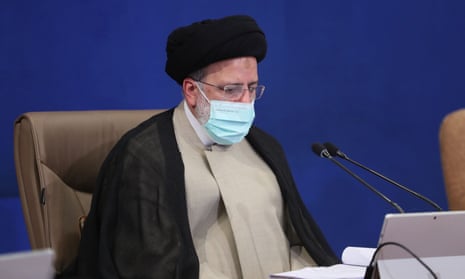The US is hoping pressure from Russia, China and some Arab Gulf states may yet persuade Iran to moderate its negotiating stance in regards to the steps the Biden administration must take before both sides return to the 2015 nuclear deal.
Talks in Vienna faltered badly last week, when the new hardline Iranian administration increased its levels of uranium enrichment and tabled proposals that US officials said at the weekend were “not serious”since they had gone back on all the progress made in the previous round of talks.
US officials at the weekend also confirmed they would press ahead with an emergency board meeting of the UN nuclear inspectorate, the IAEA, before the end of the year if Iran did not restore a level of access to its nuclear sites that satisfied the nuclear watchdog.
In Tehran, officials insisted the two major texts on sanctions and Iran’s nuclear obligations that it tabled at the Vienna talks were fully in line with the nuclear deal, saying the real roadblock was the US refusal to lift sanctions.
US officials claimed Russia and China had been “taken aback by the degree to which Iran had walked back its own compromises” from previous rounds of talks, as well as becoming more resolute about the demands it made of the US and of others.
The senior US official said: “I think they do share a sense of disappointment, to put it diplomatically, at what Iran has chosen to do with the last several months of preparation for the talks.”
The direct talks featuring Iran, Russia, China, Germany, France and the EU recommenced in Vienna last week after a five-month delay to give the newly elected Iranian administration headed by Ebrahim Raisi time to review its demands. The official claimed it was evident to Russia and China that Iran had “not adopted the posture of a country that was seriously thinking a rapid return to mutual compliance with the deal”.
The approach of the Russians and Chinese is critical since the new hardline Iranian regime has insisted it can afford to walk away from the talks with the west, effectively leaving its nuclear programme unconstrained, and fund its domestic welfare agenda by trading with the east. The threatened emergency IAEA board meeting in the next fortnight would be an early test of whether Iran is truly losing the protection of either Russia or China.
Claiming that Iran was beginning to isolate itself from its impatient natural allies, the US official said: “I think the world, which for a long time during the maximum pressure campaign [applied by Donald Trump from 2018] was more sympathetic to Tehran’s position. I think we’re seeing very clearly that countries around the world are now more and more aware of the fact that Iran is taking a position which is inconsistent with their stated goal of a return to the JCPOA [the 2015 nuclear deal] and their accelerated nuclear programme is exhibit A in that.”
The officials did not directly answer whether he thought Chinese concerns about Iran’s nuclear proliferation would extend to ending the import of Iranian oil, estimated at half a million barrels a day and one of the lifelines that has kept the Iranian economy afloat.
He also pointed to the way in which Gulf states had issued a statement in support of the restoration of the nuclear deal, a change in their previous posture. The United Arab Emirates’ most senior national security official, Sheikh Tahnoon bin Zayed Al Nahyan, is due to visit Tehran on Monday.
But the US is also having to handle Israeli demands that the US recognise that Iran is involved in nuclear blackmail. Israel’s prime minister, Naftali Bennett, told his cabinet that he wanted the Vienna negotiations, which are due to recommence at some point this week, to be postponed until Iran halted the uranium enrichment. “Iran must begin to pay a price for its violations,” he said.
An Israeli military attack on Iran’s nuclear sites would probably end any chances of effective Russian or Chinese pressure on Iran to change its negotiating tactics.
The US officials pointed to something akin to “soul searching’” or interesting reflections in Israel by former senior officials about the decision to withdraw from the 2015 Iran nuclear deal. “What it has meant is it has opened the door for an unconstrained, uncontrolled Iranian nuclear programme, which obviously was not the case while the US and Iran were both in compliance with the deal.”










